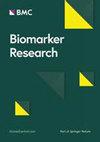Effects of protein restriction on insulin-like growth factor (IGF)-1 in men with prostate cancer: results from a randomized clinical trial
IF 9.5
2区 医学
Q1 MEDICINE, RESEARCH & EXPERIMENTAL
引用次数: 0
Abstract
Insulin-like growth factor (IGF)-1 and its binding proteins are important in cancer growth, especially in prostate cancer. Observational studies suggest that protein restriction can lower IGF-1 levels. However, it is unclear whether an isocaloric protein-restricted diet affects IGF-1 and IGFBPs in men with prostate cancer. In this academic, single-center, parallel-group, prospective, randomized, open-label, blinded end-point trial, 38 consenting overweight (BMI 30.5 ± 5.5 kg/m2) men with localized prostate cancer, aged 43–72 years, were randomized (1:1) with permuted blocks to 4–6 weeks of customized isocaloric PR diets (0.8 g protein/kg lean body mass) or their usual diet. Biomarkers influencing cancer biology, including serum IGF-1 and its binding proteins were measured longitudinally. Contrary to our hypothesis, feeding individuals an isocaloric protein-restricted diet did not result in a significant reduction in serum IGF-1. Moreover, there was no observed increase in serum IGFBP-1 or IGFBP-3 concentration. These findings demonstrate that protein restriction without calorie restriction does not reduce serum IGF-1 concentration or increase IGFBP-1 and IGFBP-3 in men with localized prostate cancer. Further research is needed to identify dietary interventions for safely and effectively reducing IGF-1 in this patient group.限制蛋白质摄入对男性前列腺癌患者胰岛素样生长因子(IGF)-1 的影响:随机临床试验的结果
胰岛素样生长因子(IGF)-1 及其结合蛋白对癌症,尤其是前列腺癌的生长具有重要作用。观察性研究表明,限制蛋白质摄入可降低 IGF-1 水平。然而,目前还不清楚等热量蛋白质限制饮食是否会影响前列腺癌男性患者的 IGF-1 和 IGFBPs。在这项学术性、单中心、平行组、前瞻性、随机、开放标签、终点盲法试验中,38 名年龄在 43-72 岁之间、患有局部前列腺癌的超重男性(体重指数为 30.5 ± 5.5 kg/m2)被随机(1:1)分配到 4-6 周的定制等热量 PR 饮食(0.8 克蛋白质/公斤瘦体重)或他们的常规饮食中。对影响癌症生物学的生物标志物(包括血清 IGF-1 及其结合蛋白)进行了纵向测量。与我们的假设相反,给个体喂食等热量蛋白质限制饮食并没有导致血清 IGF-1 的显著降低。此外,也没有观察到血清 IGFBP-1 或 IGFBP-3 浓度的增加。这些研究结果表明,对于患有局部前列腺癌的男性来说,限制蛋白质摄入而不限制卡路里摄入不会降低血清 IGF-1 浓度,也不会增加 IGFBP-1 和 IGFBP-3。需要进一步研究确定饮食干预措施,以安全有效地降低这类患者的 IGF-1。
本文章由计算机程序翻译,如有差异,请以英文原文为准。
求助全文
约1分钟内获得全文
求助全文
来源期刊

Biomarker Research
Biochemistry, Genetics and Molecular Biology-Molecular Medicine
CiteScore
15.80
自引率
1.80%
发文量
80
审稿时长
10 weeks
期刊介绍:
Biomarker Research, an open-access, peer-reviewed journal, covers all aspects of biomarker investigation. It seeks to publish original discoveries, novel concepts, commentaries, and reviews across various biomedical disciplines. The field of biomarker research has progressed significantly with the rise of personalized medicine and individual health. Biomarkers play a crucial role in drug discovery and development, as well as in disease diagnosis, treatment, prognosis, and prevention, particularly in the genome era.
 求助内容:
求助内容: 应助结果提醒方式:
应助结果提醒方式:


